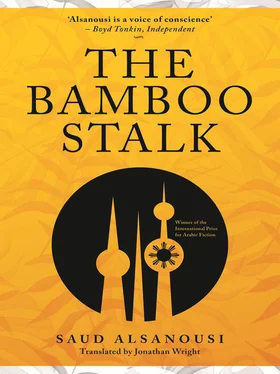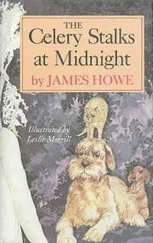The man smiled. ‘I’m not mad,’ he said in Filipino.
My mother blushed and the man continued in English. ‘I was in Kuwait during the war. We were part of a resistance group and Rashid was one of the members.’
My mother stared at the man’s face as he went on: ‘You look surprised, but I’m even more surprised than you.’
The man put his hand on the large stack of paper. ‘This is an account of our activities and the events that took place during the seven months of occupation. I started writing it more than five years ago, and the strange thing is. .’
The man hesitated before continuing.
‘Yesterday evening. .’
My mother nodded, pressing him to go on.
‘Only yesterday evening, Rashid’s role in it came to an end when he fell into the hands of the occupation forces.’
When the man had finished, my mother didn’t say a word. She was silent in the truck too and at home. After meeting the Kuwaiti man all my mother had come up with was the news that my father had been captured, and an envelope full of money that the man had given her before we left his house. My mother hadn’t told him that she was Rashid’s wife, or that I was his only son.
15
After the Kuwaiti man told us that my father had been captured in the war, Kuwait no longer meant anything to me. I automatically stopped thinking about going back to my father’s country. But my mother on the other hand continued to bring it up from time to time. ‘The promise will be fulfilled,’ she would say.
‘And what if Rashid is. .’ Aunt Aida started to ask her, but then she stopped and left the rest of the question hanging. Both of them knocked on the wooden part of the sofa.
‘Even if Rashid is dead, his promise won’t die,’ my mother said.
I felt sorry for my mother. What kind of faith could she have that didn’t waver through all those years? She was still building hopes on a man who went missing in war ages ago. I had lost interest and no longer had hopes of going to Wonderland, despite my mother’s faith.
What if the promise was fulfilled , I wondered. What if the man called Rashid did reappear? Could I really be replanted, like a bamboo stalk?
* * *
In 1997, my mother began looking for work and the first person she thought she could ask for help was Ismail, the Kuwaiti man. But by that time he had wrapped up all his business in the Philippines and gone back to Kuwait.
After some effort my mother did manage to find a job as a servant to a rich family that lived in Forbes Park in Makati. She spent the whole day working in their house, came back at the end of the day, had dinner with us and then went off to her own house with Adrian.
I felt my mother gradually growing apart from me. She was away at work and busy with Adrian and his special needs. She was often in a bad mood and always absent-minded, and I no longer saw her smile. She had changed a lot but I understood the reasons for all that and I didn’t hold it against her.
While my mother grew distant, my relationship with Aida and Merla grew stronger. I was close to both of them, despite the distance between them. I never heard Merla calling Aida ‘Mama’. Instead she called her by her name: Aida. She went out without asking permission and came back late at night. She went on trips to places far out of Manila and Aunt Aida couldn’t stop her. Although my aunt treated her daughter well, sometimes too well, and although she always tried to please her, Merla reacted in the opposite way and never treated her mother well.
The way Merla mistreated Aida made me sympathise with my aunt. One evening I heard her complaining to my mother that Merla never called her ‘Mama’. From then on I started calling her ‘Mama Aida’. It had quite an effect on the way my aunt behaved.
When someone ends up having two mothers, you can be sure they’re equally confused about their names, their country and their religion.
16
I had my twelfth birthday in 2000 and I had to go to church to be confirmed.
‘Josephine!’ Mama Aida said. ‘José is twelve now.’
We were sitting around the dining table in the kitchen.
‘You go smoke your poisons, Aida, and let José go his own way,’ Mother replied.
‘I’ve given up smoking marijuana,’ Mama Aida retorted sharply.
‘Since when?’ asked Mother with interest.
‘From today,’ answered Mama Aida, without looking at my mother.
Mother didn’t comment, but went to feed Adrian. Mama Aida continued, ‘We have to take José to church, Josephine.’
Adrian automatically made the sign of the cross in the air as soon as Mama Aida mentioned the church.
‘Sooner or later José will turn Muslim in his father’s country,’ Mother said. ‘If you’re such a believer. .’ she resumed, then paused a moment. ‘Then your daughter is now sixteen. Make her behave properly, then take her to church, or to hell.’
Mama Aida didn’t say a word.
* * *
My first visit to the Manila Cathedral was with Mama Aida, who insisted I be confirmed in the cathedral rather than just in the little parish church where I was baptised years earlier. Mama Aida asked Uncle Pedro and his wife to come and witness the rite and to join her as my sponsors. The two agreed, but my mother stuck to her position — ‘He’ll embrace Islam sooner or later’ — and she didn’t attend.
We went through the big wooden door — Mama Aida, Pedro and his wife, and me. We stopped in front of the statue of an angel carrying a font of holy water. Everyone dipped the tips of their fingers into the water and made the sign of the cross, and I did likewise.
The cathedral certainly gave me a sense of awe, but I wasn’t sure if that was because of faith. Maybe the candles, the statues and the icons played a part too.
Mama Aida, Uncle Pedro and his wife sat down and started saying prayers, while I stood in the middle on a long red carpet, wooden pews on my left and right. I had a new sensation I hadn’t known before this visit — complete serenity. There was a decorated ceiling held up by eight marble columns, large crosses on the walls and stained-glass windows. The sunbeams threw the colours of the glass on to the marble floor, and a statue of the Virgin Mary, in a white dress and a blue cloak, stood above the altar, surrounded on all sides by bouquets of flowers.
In the front seats there were lots of boys about my age, accompanied by their parents, waiting for the bishop to conduct the ceremony. Mama Aida’s excitement was a ritual in itself.
We finished the confirmation ceremony and the bishop blessed us with holy water after we had answered ‘I do’ to his questions: ‘Do you reject Satan and all his works, and all his empty promises?’ ‘Do you believe in God the Father almighty, creator of heaven and earth?’ ‘Do you believe in Jesus Christ, his only Son, our Lord?’ ‘Do you believe in the holy Catholic Church, the communion of saints, the forgiveness of sins, the resurrection of the body, and life everlasting?’
What difficult questions you ask, Father! And how easy it is to say, ‘I do, I do.’
Lucky Adrian. These questions don’t give him any trouble. He has no doubt and no faith. No uncertainty and no fear. If only it had been me who nearly drowned that night, so that my brain cells would be damaged, instead of his.
Before we left the cathedral Mama Aida gave me a crucifix on a chain. Her happiness that day was the most beautiful part of the confirmation ceremony.
17
‘José, José, José. .’
I heard the call dozens of times a day from my grandfather, and although I longed for a real name, it made me want not to have a name at all, at least when Grandfather was around, so that he couldn’t call me. The reason for the constant summoning wasn’t that he wanted to talk to me. When Mendoza called my name, an order was bound to follow. ‘Fill the trough with water for the cocks.’ ‘Clean out the pen.’ ‘Take the scraps to Whitey.’ ‘Climb the mango tree and pick some mangoes.’ ‘Warm up the oil and follow me.’
Читать дальше












